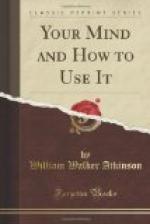One criterion that should guide in the preparation of notes is the use to which they will be put. If this is kept in mind, many blunders will be saved. Notes may be used in three ways: as material for directing each day’s study, for cramming, and for permanent, professional use. Thus a note-book may be a thing of far-reaching value. Notes you take now as a student may be valuable years hence in professional life. Recognition of this will help you in the preparation of your notes and will determine many times how they should be prepared.
The chief situations in college which require note-taking are lectures, library reading and laboratory work. Accordingly the subject will be considered under these three heads.
Lecture notes.—When taking notes on a lecture, there are two extremes that present themselves, to take exceedingly full notes or to take almost no notes. One can err in either direction. True, on first thought, entire stenographic reports of lectures appear desirable, but second thought will show that they may be dispensed with, not only without loss, but with much gain. The most obvious objection is that too much time would be consumed in transcribing short-hand notes. Another is that much of the material in a lecture is undesirable for permanent possession. The instructor repeats much for the sake of emphasis; he multiplies illustrations, not important in themselves, but important for the sake of stressing his point. You do not need these illustrations in written form, however, for once the point is made you rarely need to depend upon the illustrations for its retention. A still more cogent objection is that if you occupy your attention with the task of copying the lecture verbatim, you do not have time to think, but become merely an automatic recording machine. Experienced stenographers say that they form the habit of recording so automatically that they fail utterly to comprehend the meaning of what is said. You as a student cannot afford to have your attention so distracted from the meaning of the lecture, therefore reduce your classroom writing to a minimum.
Probably the chief reason why students are so eager to secure full lecture notes is that they fear to trust their memory. Such fears should be put at rest, for your mind will retain facts if you pay close attention and make logical associations during the time of impression. Keep your mind free, then, to work upon the subject-matter of the lecture. Debate mentally with the speaker. Question his statements, comparing them with your own experience or with the results of your study. Ask yourself frequently, “Is that true?” The essential thing is to maintain an attitude of mental activity, and to avoid anything that will reduce this and make you passive. Do not think of yourself as a vat into which the instructor pumps knowledge. Regard yourself rather as an active force, quick to perceive and to comprehend meaning, deliberate in acceptance and firm in retention.




